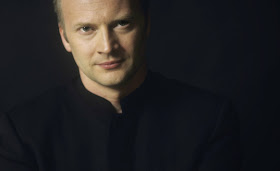Our year-end wrapup continues with the best of the concert hall.
by Paul J. Pelkonen
by Paul J. Pelkonen
 |
| Framegrab of mezzo Joyce DiDonato at the Gowanus Ballroom. Image © 2014 Warner Brothers Classics. |
 |
| Renée Fleming as Hanna and Nathan Gunn as Danilo in Lehár's "The Merry Widow." Susan Stroman's new production opens on December 31, 2014. Photo by Brigitte Lacombe © 2014 The Metropolitan Opera. |
 |
| Singers of the Trinity Choir. Photo by Leah Reddy for Trinity Church. |
 |
| A framegrab of Christoph von Dohnányi. Source: Vimeo.com. |
 |
| Waif at the door: Angela Mannino (left) Matthew Tuell (center) and Taylor Putnam in the title role in a tense moment from Markheim. Photo by Tina Buckman © 2014 The Little Opera Theater of New York. |
 |
| Uneasy lies the head...Composer Ernst Bloch, creator of Macbeth. Photo © G. Schirmer, image alteration by the author. |
 |
| Puss in Boots (left, inverted) is menaced by the Ogre (Kevin Burdette, right) in El Gato con Botas. Photo by Richard Termine for Gotham Chamber Opera. |
 |
| Revolutionary conductor Gianandrea Noseda brought William Tell to Carnegie Hall on Dec. 7. |
 |
| Back from the dead? The City Opera may be rising from the ashes. Art by John Byrne from X-Men #135 © 1978 Marvel Comics. |
 |
| Upstairs at the Kimmel Center: Yannick Nézet-Séguin. Photo by Chris Lee © 2014 The Philadelphia Orchestra. |
 |
| Ssh....it's young conductor Krzysztof Urbánski. Photo by Ole-Einar Andersen and Adresseavisen © 2014 Deutsche Grammophon |
 |
| Suzanne Mentzer (left) and John Del Carlo (right) are the only cast members remaining as the Met revives its new Le Nozze di Figaro this month. Photo by Ken Howard © 2014 The Metropolitan Opera. |
 |
| Meredith Monk performing On Behalf of Nature. Photo from meredithmonk.org |
 |
| A tender moment: James Morris and Annette Dasch in Act III of Die Meistersinger. Photo by Ken Howard © 2013 The Metrropolitan Opera. |
 |
| Much to this guy's relief, the Met is getting out of the lottery business. New York Lottery image © New York State Lottery. Photo alteration by the author. |
 |
| Score! Jaap von Zweden on the podium. Photo by Hans van der Woerde, courtesy IMG Artists. |
 |
| The South African tenor Johan Botha returns in Die Meistersinger. Photo © 2007 The Metropolitan Opera courtesy the Metropolitan Opera Press Department. |
 |
| Hyesang Park as Fiorilla in Il Turco in Italia. Photo by Ken Howard © 2014 The Juilliard School. |
 |
| Conductor Jaap van Zweden returned to the New York Philharmonic. Photo © 2014 The Dallas Symphony Orchestra |
 |
| Michael Tilson Thomas. Photo © 2013 San Francisco Symphony. |
 |
| Mahler groove: conductor Michael Tilson Thomas. Photo © 2014 San Francisco Symphony. |
 |
| Conductor Jacques Lacombe. Photo by Fred Stucker © 2014 New Jersey Symphony Orchestra. |
 |
| The pianist Pierre-Laurent Aimard. Photo by Felix Broede for Deutsche Grammophon/UMG. |
 |
| On the Case--Scaglione at the New York Philharmonic. Photo by Chris Lee © 2014 The New York Philharmonic. |
 |
| Riccardo Chailly. Photo © 2014 Decca Classics/UMG |
 |
| Left: conductor Thomas Crawford. Right: Johann Sebastian Bach. The conductor performs Bach's Mass in B Minor on Nov. 15. |
 |
| Pablo Heras-Casado. Photo by Josep Molina © 2014 Harmonia Mundi. |
 |
| We can talk about Joyce: La DiDonato in a publicity still. Image courtesy Warner Music Group. |
 |
| Conductor Kent Tritle leading the Oratorio Society of New York at Carnegie Hall. Photo by Tim Dwight © 2014 The Oratorio Society of New York. |
 |
| That's no moon...A scene from Lady Macbeth of the Mtsensk District. Photo by Winnie Klotz © 2000 The Metropolitan Opera. |
 |
| Yannick Nézet-Séguin. Photo by Marco Borggreve from the conductor's official site. |
 |
| New York Philharmonic first chair flute Robert Langevin. Photo by Chris Lee © 2014 The New York Philharmonic. |
 |
| My new (well, gently used!) score of Die Meistersinger von Nürnberg. Photo by the author. |
 |
| Image from Monopoly © Parker Brothers. |
 |
| Collaborators: Yefim Bronfman (at keyboard) and conductor Alan Gilbert. Photo by Chris Lee © 2014 the New York Philharmonic. |
 |
| Organ master Cameron Carpenter and his large touring friend. Photo © 2013 Sony Classical |
 |
| Jacques Lacombe leading the NJSO. Photo by Fred Stucker © 2010 The New Jersey Symphony Orchestra. |
 |
| The St. Ignatius Loyola Choir and Orchestra. Photo by Rachel Papo © 2014 Sacred Music in a Sacred Space. |
 |
| A pianist at home: Joel Fan. Photo courtesy Inverne Price. |
 |
| Lullaby of Broad Streeet? Alan Gilbert. Photo of Alan Gilbert by Chris Lee © 2013 The New York Philharmonic. Background photo of Broad Street © Google Earth. Photoshop by the author. |
 |
| Esa-Pekka Salonen in action. Photo courtesy toe Los Angeles Philharmonic. |
 |
| Symphonia Domestica: the Strauss family (Richard, Pauline, Franz) in the year 1910. Photo © 1910 the Estate of Richard Strauss. |
 |
| Me and my shadow: Jarett Ott (left) and Joseph Beutel (right) flank Jenna Seladie in Alexandre Bis. Photo © 2014 Richard Termine, courtesy Gotham Chamber Opera. |
 |
| Leon Klinghoffer, 1916-1985. |
 |
| Lisa Batiashvili and friend. Photo courtesy the Berlin Philharmonic. |
 |
| The blood couple: Željko Lučić (top) and Anna Netrebko in Macbeth. Photo by Marty Sohl © 2014 The Metropolitan Opera. |
 |
| The conductor Jacques Lacombe. Photo by Daniel Cossette © 2014 Canadian Broadcasting Company |